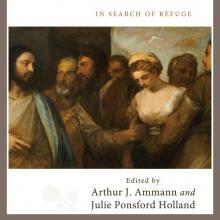circle
IT WAS LIKE the end of the movie Lincoln. In an instant, one whole side of the House of Representatives turned, looked up at the five core fasters from the Fast for Families and erupted in overwhelmingly spirited applause. The applause reverberated throughout the chamber for what seemed like an eternity, though it was really only minutes. Ah, but what grand minutes. I wept. My body, standing there in the gallery, could not contain it.
The Fast for Families: A Call for Immigration Reform and Citizenship was launched on Nov. 12 with core fasters abstaining from all food and drinking only water. Based in a tent on the National Mall, only a few hundred yards from the Capitol building, the fast was sponsored by nearly 40 church and labor organizations and garnered support from more than 4,000 solidarity fasters across the U.S. and around the world. Our goal: To move the hearts and compassion of members of Congress to pass immigration reform with a path to citizenship.
In the Capitol building on Dec. 2, during the hour before the startling ovation, Eliseo Medina (the leader of the fast, which had reached the end of its 21st day on that Monday evening), D.J. Yoon (executive director of NAKASEC, a Korean-American advocacy agency), Cristian Avila (from Mi Familia Vota), and I received House member after member who’d come to visit us in the gallery to say “thank you for your sacrifice.” All the faces and names you usually see flashed across the screen commenting on the events of the day on cable television shows—they came to us, standing in the flesh, shaking our hands, grateful and concerned for our health.
EXCLUDING WOMEN from leadership weakens the commitment and contributions of churches, theological institutions, and the global church in their participation in God's prophetic mission. It translates to women's priorities and specific needs being inadequately articulated and under-resourced.
For instance, matters of sexuality, reproductive health education, and justice are hardly ever discussed in churches or theological institutions, except when governments want to legalize abortion. Similarly, little attention is given to maternal health care despite the high rates of maternal death and infant mortality in Africa. It is not enough for churches to focus on baptizing children, blessing them, and welcoming them into the house of God when they neglect to care for their well-being from the time they are in their mothers' wombs, especially now that so many children are born HIV-infected. Responsible and healthy sexuality, childbearing, and parenting are matters that require full engagement of both women and men, and the churches should be at the forefront of providing much-needed education.
Women have been left to shoulder the burden of the times: preventing HIV transmission, facing HIV-related stigma, handling deaths, and addressing the myriad other adverse impacts that the HIV pandemic has created. Similarly, in the Circle of Concerned African Women Theologians, of which this author is a founding member, women have provided leadership in naming theological, ethical, cultural, and religious beliefs, as well as harmful practices and leadership styles, that fuel gender disparity, social injustices, and the spread of HIV in religious communities and in society at large. The Circle also has endeavored to provide theological and ethical reflections that are empowering and transformative to the behaviors contrary to God's will for how women and men relate to each other in families, religious contexts, and everyday life.

